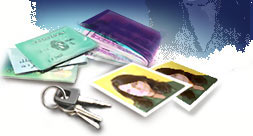The Rediff US Special/ Meera Nair


The holding cage on the top floor of the 88th Precinct in Brooklyn, New York didn't look big enough to contain a large Doberman, let alone a fully grown criminal.
The floor beneath my feet was littered with crushed Fritos and the radio near the dispatcher's desk muttered ominously from time to time. My husband, Arun and I sat in front of the cell, waiting for a Detective Samuels to show up. This was my second visit to the police station in 20 days.
I was here because someone had stolen my identity.
Even as I waited in the police station, on that freezing Friday morning, some other woman calling herself Meera Nair was using my checks, my address and a false driver's license in my name, to nonchalantly spend my money in retail stores in New York and New Jersey.
It all began when we came back from our Christmas vacation in Texas and found a huge pile of overdraft notices from our bank. I felt a growing sense of panic as I ripped open the envelopes and toted up the amounts. Our checking account, and the savings account linked to it, were wiped out. Thousands of dollars, including money given to us as wedding gifts, when we got married eight months ago, had vanished.
That night, as we sat there distraught, the phone rang. It was a jewelry store from Tom's River, New Jersey, calling to say that a check I had written on December 22 had bounced. They had found my number in the phone book.
I had been in Houston that day. I had never visited Tom's River in my life. Except for one check for some US $ 38, both of us had never withdrawn any money from this particular joint account. They had a driver's license number on the check and I don't drive. Someone else was pretending to be me.
As it turned out, someone had stolen a box of checks sent to us by mail. We had notified the bank that we hadn't received the checks and we had picked up another box directly from the bank. But the bank had neglected to cancel the first batch and now someone was using them to steal our money.
Overnight I had become yet another statistic in the growing numbers of Americans who are victims of identity theft. According to consumer organizations like CALPRIG and other industry statistics, between 500,000 and 700,000 people will have their identities stolen this year.
Don't ask us, we're just the bank
Although our bank was to blame for not canceling the missing checks, they would do nothing unless we brought them a police report. All they did was close our account and give us some cursory advice. Dara Stewart, the bank employee in charge of fraud said, "Call the credit unions. Do that first thing."
She meant Experian, TransUnion and Equifax, the three national credit bureaux that track credit applications and provide and credit information to potential lenders. We called them and put a fraud alert on our account. The police refused, at first, to take our case unless we brought an affidavit from the bank. But when we pointed out the Catch-22 they were putting us in, they wrote us a report of petty larceny.
After we submitted the police report on January 5, the bank took more than two weeks to get us the actual forged checks. After several phone calls and personal visits, they finally opened a new account and returned our money.
Today, more than a month and a half later, we are still waiting to get new checks from the bank and actually access our money.
That's not my signature!
When I finally got the used checks from the bank, the forger's signature looked nothing like mine. Yet the bank had passed over a hundred checks without bothering to call us.
Looking at my forged signature, at the bottom of the checks, brought a strange feeling. I felt violated, as of someone had come uninvited into my house and used my things with impunity. I was obsessed with this person who was impersonating me. I agonized over her shopping patterns. She had made a lot of purchases at Toys 'R' Us, Costco, Rite Aid, Walmart and Target.
This was no flashy spender dropping money at Fendi or Gucci or even Bloomingdale's. She'd just bought ordinary stuff at chain department stores. I would look at the women walking by me on the street near my house and wonder if the woman-who-would-be-Meera had passed me by. Perhaps, I reasoned, this was just another poor mom trying to provide for her kids.
Modus Operandi
At the precinct, Detective Samuels had another angle on the whole thing. He said, "They (identity thieves) work in gangs. One of them visits these stores and buys toys and other goods. Then someone else sells the stuff on the street." That put a quick end to my Needy Mom Theory. The option Detective Samuels presented was even more frightening -- my name and address had fallen into the hands of a slick criminal gang.
Detective Samuels checked the NY driver's license number against those in the DMV's computers. It wasn't listed. That too was typical of identity theft. The Federal Trade Commission's website states that 45 per cent of the reported cases involved the victims' driver's licenses. They suggest that victims call their local DMV office.
When I called my local DMV office they said they couldn't do anything because the license wasn't listed. All I could do is report it to the FTC. I gave up trying to reach the FTC after I was put on hold for 30 minutes. However they do have a web site with an online form to report ID theft. And of course, there's always regular mail.
Detective Samuels also suggested I call the post office. "Sometimes people at the post office are stealing check books from the mail," he said. Listening to him I felt helpless. Was there any institution one could trust or depend upon?
As for the police, they weren't very helpful. They know that victims are reimbursed by the banks and the defrauded companies themselves claim insurance. Our case hadn't been assigned to anyone, Detective Samuels told us. "Even if we catch the thief, it's impossible to prosecute, because you have to prosecute in the state the check has been used in. It's all very complicated and they know that," he shrugged.
Show us the money
The real nightmare started when the letters from check collection bureaux began arriving in the mail. They threatened us with legal action if their money wasn't paid and the dishonored checks were not reimbursed. I began to dread looking in my mailbox and seeing more letters.
I spent hours on the phone everyday calling each company and explaining my predicament. They wanted proof and I made photocopies of our affidavit and police report and mailed it to each company. Then I followed up with phone calls once again to make sure our name was cleared. I contacted Chexsystems (see list at the end of article) and had them send me a list of companies who had flagged my name.
The lady at Cheksystems said, "You may not be able to write checks at certain merchants until you have sent your affidavit to every company." Around 150 checks had been stolen -- that translated to a lot of affidavits. My situation seemed to be getting worse everyday.
I sent the national credit agencies copies of the affidavit and the police report. And all this -- every fax, letter, phone call-- was done at my own expense. In fact industry statistics show that victims spent an average of 175 hours and US$ 808 in out-of-pocket costs (not including the lawyer's fees) trying to fix their problem.
Life after crime
The good news? The bank gave us back our money and we have done everything we can to protect ourselves.
The bad news? I am still dealing with letters from retailers asking for their money. My name and address has been flagged with merchants citing bad credit. I still make phone calls, write letters and mail copies of our reports. I know this will go on for months. I also live with the thought that some stranger out there has my name and address that she could use for criminal activity.
Part II: What to do if your identity gets stolen